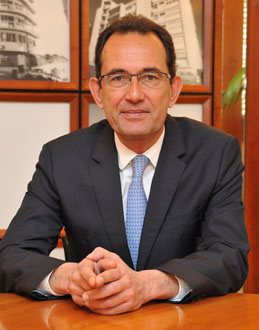805,000 treatment forms, 60,000 medical opinions and 8,000 new employee registrations. Annual figures that make one’s head spin. But that is what is managed by Caisses Sociales de Monaco, whose Director, Jean-Jacques Campana, we met.
What are the tasks of Caisses Sociales de Monaco?
They appoint the joint administrative organisation which manages Monaco’s 4 basic social systems:
- CCSS (Caisse de Compensation des Services Sociaux)
- CAR (Caisse Autonome des Retraites)
- CAMTI (Caisse d’Assurance Maladie, Accident et Maternité des Travailleurs Indépendants)
- CARTI (Caisse Autonome des Retraites des Travailleurs Indépendants).
These are medical benefits systems and basic pension systems, and - for employees – family allowances and social security benefits (housing allowance, education allowance etc.)
Moreover, the responsibilities of CCSS have been extended to collection of deductions payable to the Office de la Médecine du Travail, Caisse de Garantie des Créances des Salariés and Caisse des Congés Payés du Bâtiment, as well as domestic workers’ private pension scheme deductions. And since 1 January 2011, also collection of unemployment insurance contributions on behalf of UNEDIC.
It is very interesting to note that we combine local and national funds functions; in addition to operational tasks we are also involved in drafting the social code.
Does that entail large staff numbers?
235 colleagues ‘manage’ 49,000 employees, 30,000 pensioners and 21,000 assignees, in addition to 3,400 self-employed people, 2,100 associated pensioners and 1,800 assignees.
We develop our own IT business applications due to our numerous special features. Over 43 officers and managers are dedicated to developing, maintaining and operating our information system in an increasingly changing and complex regulatory environment, particularly in the health insurance area. Moreover, given the diversity of our tasks, we are organized in relatively small functional units - for example there are twenty people dedicated to collection and control of deductions and unemployment insurance contributions.
How is a person ‘registered’ with Caisses Sociales de Monaco?
For employees, the issue of their work permit is the starting point for registration with our organizations, while for the self-employed it is the attribution of their licence by the Department of Economic Development. Finally, residents can benefit from the free state medical benefits, subject to being based in the Principality for a certain prior time.
What are the major challenges of the coming years?
Clearly, the further industrialisation of our production tools, with the triple objective of improving service provided to insured parties, electronic data interchange and automating calculation procedures. We have already implemented many remote services for insured parties (account checking, e-mailing of calculation records for medical benefits or family allowances etc.) as well as employers’ remote services (electronic filing and payment of CCSS-CAR deductions, and also unemployment insurance contributions, account and staff checking etc.) Remote transmission of CHPG (Centre Hospitalier Princesse Grace) invoices and doctors’ certificates is working very well. Over the coming months, we are going to complete this offering with remote transmission of pharmacy invoices, dental treatment electronic records, electronic filing of domestic workers’ deductions, and the overall modernization of the website. It will soon include an English version and be compatible with all mobile devices.
Are Caisses Sociales de Monaco an element of attraction for the country?
The overall surplus results recorded in 2013-2014 i.e.
- CAR: euro 23 million
- CCSS: euro 9.2 million
- CARTI: euro 2. 2 million
- CAMTI: euro 1.9 million
evidence the strength of our social protection systems, which I believe reassures people wishing to move to Monaco.
In addition, the highly protective nature of our health agreements needs to emphasised. They strictly restrict the eventuality of excesses of fees for the 75% of insured parties with the lowest benefits entitlement codes.






